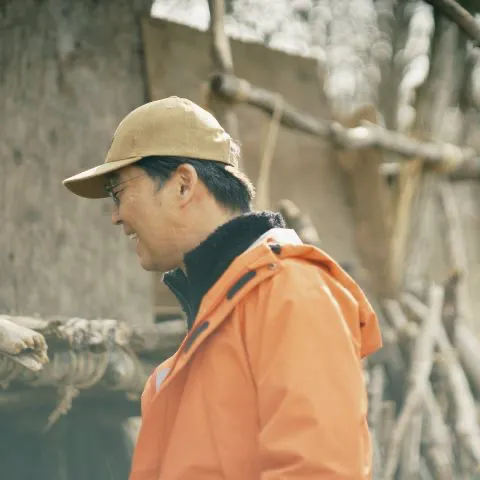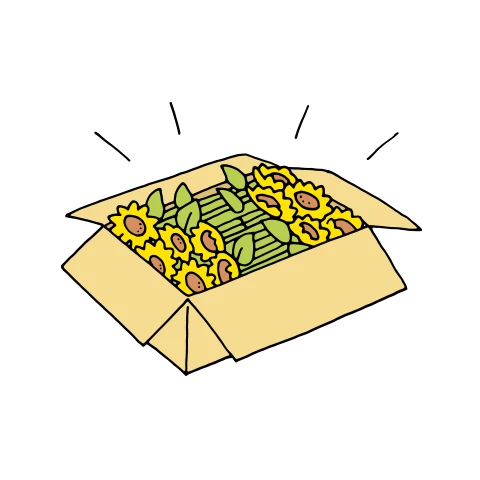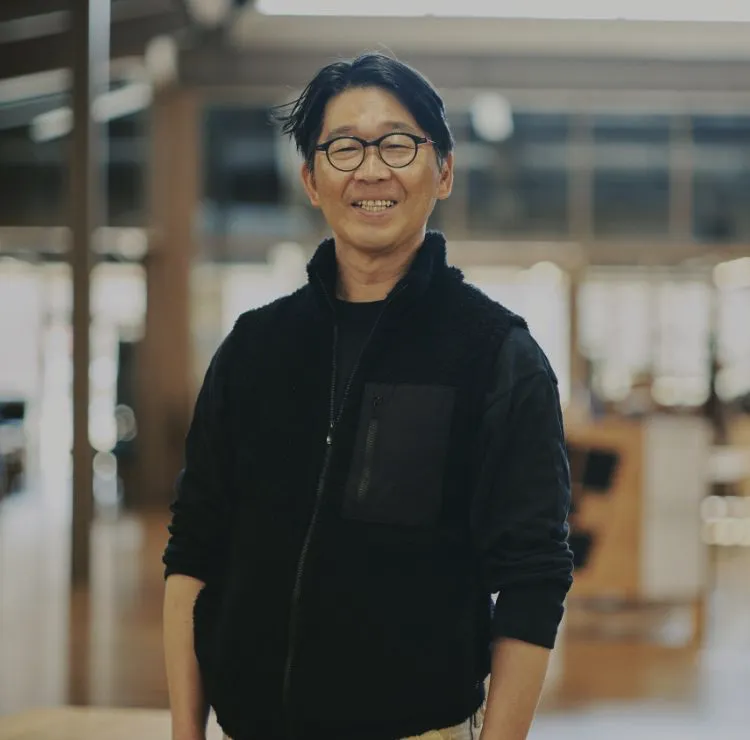In this interview series, we invited people to reflect on their life while looking back on their shopping history with Rakuten. Featured this time is Shinnosuke Honjo, who founded Rakuten alongside Chairman and CEO Mickey Mikitani, helping to lay the foundation for the company. After retiring as vice president of Rakuten, he has been active in the field of education, and currently serves as chairman of Karuizawa Kazakoshi Gakuen, a school established in April 2020 in the town of Karuizawa, Nagano Prefecture. His Rakuten experience is something he draws from to this day in his role at the school.
From learning programming languages to making sales,
we started Rakuten from scratch.

Rakuten: Please begin by telling us about the foundation of the company. When did the idea for Rakuten's business begin?
Shinnosuke Honjo: At first, Mickey, myself, and two other staff members were running a consulting company with only four people. After the other two left, Mickey and I were left alone, and we discussed starting something new in the fall of 1996. We were talking about doing one of the following: franchising an organic yeast bakery, franchising a microbrewery restaurant, or an online shopping mall. Of these, online shopping was the one that would require the least amount of startup capital. We weren’t entirely certain that this was the best way to go, but we figured we had to get started somewhere, so we started there. We had no servers, so I borrowed one from a friend and set it up, and since neither Mickey nor I could program, I asked a team of engineers I knew to do it. But our deadline passed, and the work wasn’t done... Then Mickey bought a book titled "SQL for Beginners" and said, "We have to create the system by ourselves. Honjo, read this book and make it." I tried my absolute best while reading that book, but nothing came of it (laughs). So I had an engineer from a software company that I still work with today dispatch an engineer to teach me for about two weeks, and we started making the system little by little. That still wasn’t really getting us anywhere, but then, a friend of mine introduced me to a brilliant programmer. Meanwhile, Mickey and I were both studying the C programming language while that acquaintance was creating the system. We really started from scratch.
Rakuten: From there, the company was established in February 1997. That's pretty speedy.
Shinnosuke Honjo: I worked in the office until 3 or 4 a.m. every night. Then I’d start working from 9:00 a.m. again the next day.
Rakuten: Did you also do sales work to bring new vendors onboard?
Shinnosuke Honjo: Yes. While we were working on the system, Mickey, other staff members and I all went on sales calls. The original idea was to have about 100 stores open, but we did not achieve that goal. We opened with 13 merchants.

Rakuten: Do you have any memorable episodes with merchants?
Shinnosuke Honjo: When I was in high school, I lived in a dormitory in Hakodate, in Hokkaido prefecture. So, after the Golden Week holidays of 1997, I went to Hakodate on a sales trip, hoping to convince a store in the place that holds fond memories for me to join Rakuten Ichiba. I went to the morning market and went from store to store. Among them, I went to Hakodate Kaneni, which sells seafood. Mr. Fujita, the president of the company, let me explain the Rakuten Ichiba system to him. I still remember how seriously Mr. Fujita listened to me, giving me his seal of approval right on the spot. He said, "I don't know much about this Rakuten Ichiba, but I think I can trust you." Hakodate Kaneni is still a Rakuten Ichiba merchant, and whenever I visit Hakodate, I stop by the store and we continue to keep in touch with each other. Back in 1997, we honestly had no idea what Rakuten would become. But Mr. Fujita trusted me enough to pay the 600,000 yen per year merchant fee. Mr. Fujita's words were a great support for me. My strong desire to live up to his expectations reinvigorated my determination to support the store owners with a system that would bring in as many customers as possible.
Rakuten: Did things go smoothly for Rakuten Ichiba following its opening?
Shinnosuke Honjo: We worked hard to open the marketplace, but at first, nothing was selling. Online shopping wasn’t at all common in those days. Most people weren’t familiar with the act of entering their credit card numbers or paying in advance at a bank to make purchases.
Shopping at Rakuten Ichiba myself in order to improve the service.
Rakuten: What kind of people were using the service in the beginning?
Shinnosuke Honjo: Mickey and our staff at the time tried it out, and some of our acquaintances made purchases too.
Rakuten: Did you buy anything?
Shinnosuke Honjo: My first purchase was sunflowers from a florist. I ordered about 30 of them, but I was shocked when I opened the box. There was no wrapping, just a bunch of sunflowers hastily tossed into a cardboard box. The flowers I had bought were ruined, and I was so disappointed.
Rakuten: So, at first, the merchants didn't really understand how to sell products online?
Shinnosuke Honjo: Exactly. So we realized there was a need to not only create an online shopping system, but also to communicate how to sell and deliver the products. We created "Rakuten University" to teach how customers like to receive products, how they feel while waiting for them, and so on. It is a place to learn how to operate an online store and to learn from each other. Stores in the same industry or category that open in the same shopping mall kind of become rivals. However, I believed that there would be a synergistic effect by connecting these people and exchanging expertise. I was an amateur in the business world, but I was able to learn on the spot by watching the practices of others, and I used this as the content for Rakuten University.
Rakuten: From there, the number of users and the number of merchants gradually increased, and Rakuten Ichiba started to grow.
Shinnosuke Honjo: After that, we developed a mail magazine publishing system called R-Mail, which allowed merchants to deliver information to customers via email. We also developed an auction system called R-Auction, which allowed people to participate in auctions without having to make a purchase, leading to an increase in the number of users. I believe that the Rakuten University community also contributed to the expansion of Rakuten Ichiba.
Retirement as vice president was a promise to myself.

Rakuten: You retired as vice president in 2002. Why did you choose this timing?
Shinnosuke Honjo: Mickey joined the Industrial Bank of Japan and left when he was 30 years old. At the time when I was job-hunting, I was also aiming for the Industrial Bank. Separately from my own aspirations, Mickey had quit the bank of my dreams. When I first met Mickey, I was asking him why he quit. After we met, I began to visit Mickey's office to watch him work up close. At that time, I decided that since Mickey quit the Industrial Bank at the age of 30, I would start my own business at the age of 30 too.
Rakuten: Why did you decide to take on the field of education?
Shinnosuke Honjo: Actually, I was not thinking of getting involved in education at that time, but when I was 30 years old, I approached Mickey about starting my own business. I said, "Mikitani-san, you may not remember this, but I told you before that I would go independent when I turned 30. So I am resigning." When I said this, he wouldn’t accept it at first. I knew that unless I said something that would convince Mickey, he would not let me quit, so I declared, "I want to go into education." It didn't matter if the time to start my own business was two years or ten years from now; for me, keeping my promise to myself was the top priority. After that, I spoke to Mickey about it several times and finally, he agreed. When I did finally quit, he said to me, "Don't let your passion die out. As long as you have passion, you can make it happen." Those words have stayed with me to this day.
Rakuten: In 2002, what kind of business was Rakuten doing?
Shinnosuke Honjo: It was the time when the store opening fee switched from 50,000 yen per month to a scaled payment system. It was also the time when Rakuten declared its goal of achieving annual GMS (gross merchandise sales) of one trillion yen. It was around 2001 and 2002 that we changed our strategy. Many people told me it would be a waste to quit at this point. They said that I could still accomplish a lot and that Rakuten would grow even more in the future. The fact is, Rakuten has grown tens of thousands of times more than I ever imagined.
Rakuten: Have you ever had moments where you regret that decision?
Shinnosuke Honjo: Sometimes I wonder what would have happened if I had stayed at Rakuten. However, there are many people I have met and many things I have been able to achieve because I left. Since leaving, Mickey appears in my dreams every once in a while. In fact, it was a dream I had in the fall of 2015 in which Mickey appeared that led me to establish Karuizawa Kazakoshi Gakuen. In the dream, he asked me, "Honjo, what is your mission?" Although I had been involved in education as a junior high school principal and as a nursery school caregiver after I left Rakuten, hearing Mickey's words in my dream flipped a switch in my mind — I had to get serious about starting a school. I quickly began preparing to build one. When we started building the campus, Mickey appeared to me again in a dream, looked at the blueprints, and was angry with me. When we started holding school information sessions in 2017, he was also angry with me, saying that the reception operation was not organized properly. In my dreams, I am getting pep talks and being given advice on important decisions.
The school becomes a reality thanks to experience gained at Rakuten.

Rakuten: Karuizawa Kazakoshi Gakuen launched in 2020. What kind of school is it?
Shinnosuke Honjo: I believe it is important for each student to learn at his or her own pace and in his or her own way. At our school, we call this “individualized learning.” We rarely hold classes all at once. For example, some students learn using tablets, some learn from paper textbooks, and the worksheets they use and their areas of study differ from one student to the next. We also use artificial intelligence for learning. If children grow up without the experience of learning and creating for themselves, they will become indifferent to society and their own future. We believe it is important for children to create their own learning in order to develop an awareness that they are capable of building their own future.
Rakuten: The school uses an educational method that is quite rare in Japan, doesn’t it?
Shinnosuke Honjo: Yes, it is. I don’t think there are many schools of this size that have students from kindergarten to junior high school. When you go out into the world, you encounter people of all ages, so I think it’s only natural to have students from across a 12-year age range interacting with each other, just like in society at large.

Rakuten: How has your experience at Rakuten been reflected in the creation of the school?
Shinnosuke Honjo: It’s the importance of making things with our own hands. I learned from Rakuten that the muddier things are, the more you have to work with your own hands. There are so many ideas in the world, but there are very few people who can execute on those ideas. It is more important to make ideas happen than to come up with them. In order to execute, it is important to think about operations and communicate with people. This was also true in the creation of the school. When building this school, I cut down trees and cleared a forest, designed the desks for the library, and designed my own system. There are also similarities between learning at the school and opening a store on Rakuten. The first step for a merchant is to create their own website. When Rakuten Ichiba first opened, it was typical to hire a design company to create a website and have it updated by a systems company. But now, store managers are creating their own websites to sell their products. The creation of a store with such creativity and ingenuity is connected to children creating their own learning by themselves. I believe that creativity, the idea of creating one's own future, is a theme that will become increasingly more important in the future.


Rakuten: You have publicly stated that you will retire from Karuizawa Kazakoshi Gakuen in 2033.
Shinnosuke Honjo: I have decided to leave in March 2033. At that time, it will have been 12 years since Kazakoshi Gakuen opened. The students who entered the school as young kids when it opened will graduate after going through elementary school and junior high school, having spent 12 years in this place. I will graduate along with them. In the 2032 school year, I will be exactly 60 years old, having left Rakuten at the age of 30 to enter the world of education, and graduating at the age of 60. I think that's a good note to go out on.
Rakuten: Do you have any plans for what’s next?
Shinnosuke Honjo: I’m not thinking about it. I guess I will try whatever appeals to me at that time.
Rakuten, which continues to surprise the world, and Karuizawa Kazakoshi Gakuen, which practices a new kind of education.
Rakuten: Do you still shop on Rakuten?
Shinnosuke Honjo: Even after moving to Karuizawa, Rakuten has made my life easier, because it’s such a convenient way to shop. I also buy supplies for the school through Rakuten. I bought a replacement blade for a chainsaw for cutting wood.
Rakuten: What do you expect from Rakuten in the future?
Shinnosuke Honjo: I hope that Rakuten will continue to surprise the world. Like when you formed the Tohoku Rakuten Golden Eagles, Rakuten Bank, the credit card company, Rakuten Mobile and the shift to English communication in the company. People were skeptical, saying, "Is that even possible?" But Rakuten has made it happen time and again. As I said earlier, I value execution, not ideas. I am very much looking forward to seeing what Rakuten will do in the future.


Shinnosuke Honjo / Born in Hokkaido in 1972. He was a graduate student at Keio University’s Graduate School of Media and Governance, where he met Hiroshi Mikitani while job hunting. In 2008, he established Karuizawa Kazakoshi Gakuen, a “mixed school” of kindergarten, elementary school, and junior high school, and became president. Since then, he has been creating a place for children to learn freely.

At the opening of Rakuten Ichiba he purchased about 30 sunflowers. Although they arrived, he was surprised to find them packed in a box so messily. He felt the need to convey how to sell and deliver them to the merchants, so he began lecturing on the know-how through Rakuten University.
Back to Top
